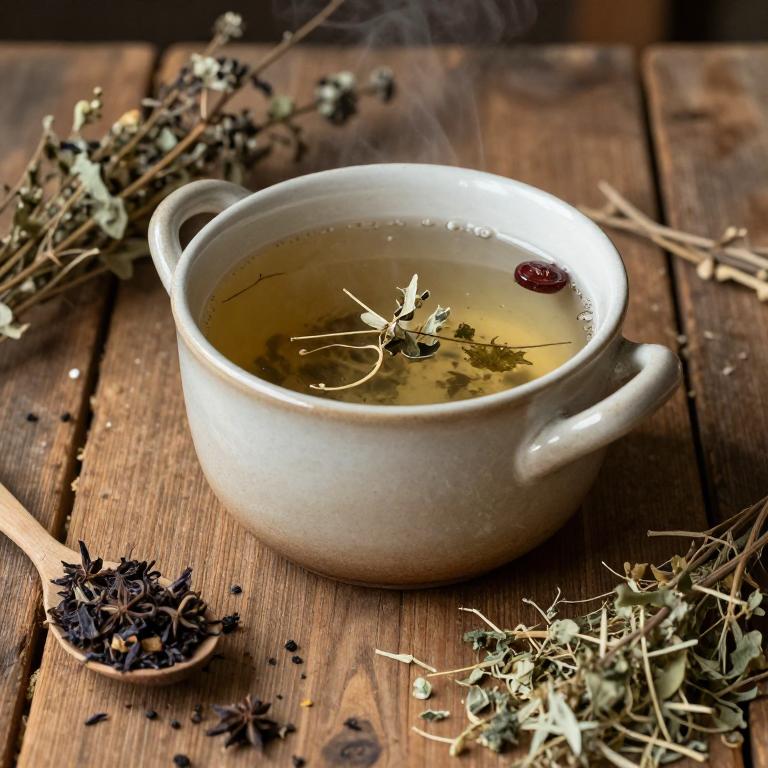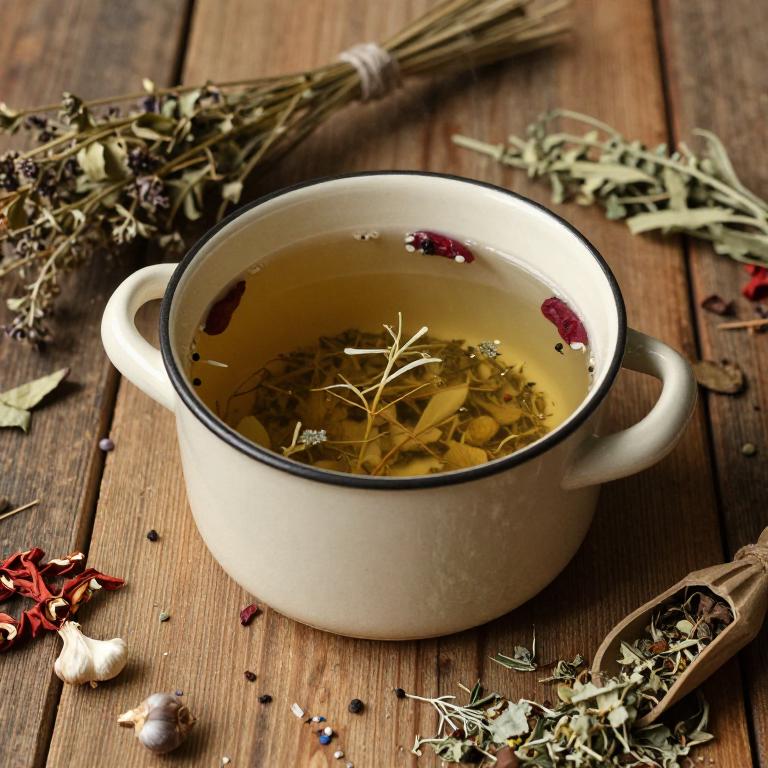10 Best Herbal Decoctions For Cramps

Herbal decoctions have long been used to alleviate cramps, particularly those related to menstrual discomfort, digestive issues, or muscle strain.
These preparations typically involve simmering a mixture of dried herbs in water to extract their active compounds, which can have soothing, anti-inflammatory, or antispasmodic effects. Common herbs used in such decoctions include ginger, chamomile, turmeric, and cramp bark, each contributing unique therapeutic properties. To prepare a decoction, the herbs are usually boiled for 10 to 20 minutes, then strained and consumed warm.
While herbal decoctions can be effective for mild cramps, it is advisable to consult a healthcare professional, especially for persistent or severe symptoms.
Table of Contents
- 1. Ginger (Zingiber officinale)
- 2. Chaste tree (Vitex agnus-castus)
- 3. Turmeric (Curcuma longa)
- 4. Dog rose (Rosa canina)
- 5. Stinging nettle (Urtica dioica)
- 6. Ceylon cinnamon (Cinnamomum verum)
- 7. Fennel (Foeniculum vulgare)
- 8. Chinese peony (Paeonia lactiflora)
- 9. English lavender (Lavandula angustifolia)
- 10. Chamomile (Matricaria chamomilla)
1. Ginger (Zingiber officinale)

Zingiber officinale, commonly known as ginger, has been widely used in herbal medicine for its ability to alleviate cramps, particularly those related to menstrual discomfort, gastrointestinal issues, and muscle spasms.
The active compounds in ginger, such as gingerol and shogaol, possess anti-inflammatory and analgesic properties that help reduce pain and inflammation associated with cramps. To prepare a herbal decoction, fresh or dried ginger root is typically sliced and simmered in water for about 15 to 20 minutes, allowing the beneficial compounds to infuse into the liquid. This decoction can be consumed warm, often with a pinch of honey or lemon to enhance flavor and aid digestion.
Regular consumption of ginger decoctions may provide natural relief from cramps while supporting overall digestive and hormonal health.
2. Chaste tree (Vitex agnus-castus)

Vitex agnus-castus, commonly known as chasteberry, is a traditional herbal remedy often used to alleviate menstrual cramps and hormonal imbalances.
Herbal decoctions made from the dried berries of the plant are typically prepared by simmering the leaves and flowers in water for several minutes, then allowing the mixture to steep. This preparation method helps extract the active compounds, such as flavonoids and iridoids, which are believed to support hormonal regulation. Studies suggest that vitex may help reduce the severity of menstrual cramps by influencing the pituitary gland's production of luteinizing hormone.
However, it is important to consult a healthcare provider before use, especially for individuals with existing medical conditions or those taking other medications.
3. Turmeric (Curcuma longa)

Curcuma longa, commonly known as turmeric, has been traditionally used for its anti-inflammatory and analgesic properties, making it a popular choice for alleviating cramps.
The herbal decoction of curcuma longa is typically prepared by boiling the rhizomes in water to extract its active compounds, such as curcumin, which are responsible for its therapeutic effects. This decoction is often consumed warm to help ease menstrual cramps, digestive discomfort, and muscle spasms. Studies suggest that curcumin may help reduce inflammation and oxidative stress, contributing to its effectiveness in managing various types of cramps.
However, it is important to consult a healthcare provider before using curcuma longa decoctions, especially for prolonged periods or in combination with other medications.
4. Dog rose (Rosa canina)

Rosa canina, commonly known as rosehip, has been traditionally used in herbal medicine for its potential benefits in alleviating cramps.
The decoction of Rosa canina berries is often prepared by simmering the dried fruits in water to extract their active compounds, including high levels of vitamin C, flavonoids, and essential oils. This herbal remedy is believed to help reduce inflammation and muscle spasms, making it useful for menstrual cramps and digestive discomfort. The anti-inflammatory and analgesic properties of Rosa canina may support the body's natural healing processes.
However, it is important to consult a healthcare professional before using Rosa canina decoctions, especially for individuals with underlying health conditions or those taking other medications.
5. Stinging nettle (Urtica dioica)

Urtica dioica, commonly known as stinging nettle, has been traditionally used in herbal medicine for its potential to alleviate cramps, particularly in the menstrual cycle.
When prepared as a decoction, the leaves and stems of the plant are simmered in water to extract their bioactive compounds, including flavonoids, minerals, and antioxidants. This herbal remedy is believed to help reduce inflammation and ease muscle spasms, making it a popular choice for women experiencing dysmenorrhea. The decoction can be consumed as a tea or taken in capsule form, often combined with other herbs for enhanced efficacy.
However, it is important to consult a healthcare provider before using stinging nettle, especially for pregnant women or those on medication, to ensure safety and appropriateness.
6. Ceylon cinnamon (Cinnamomum verum)

Cinnamomum verum, commonly known as true cinnamon, has been traditionally used in herbal medicine to alleviate cramps due to its warming and anti-inflammatory properties.
When prepared as a decoction, the bark of the cinnamon tree is simmered in water to extract its essential oils and active compounds, such as cinnamaldehyde and eugenol. This herbal remedy is often used to relieve menstrual cramps, muscle spasms, and digestive discomfort by improving blood circulation and reducing uterine contractions. The aromatic and soothing nature of cinnamon decoctions can also help ease stress-related cramping and promote overall relaxation.
However, it is important to consult a healthcare provider before using cinnamon decoctions, especially for prolonged periods or in combination with other medications.
7. Fennel (Foeniculum vulgare)

Foeniculum vulgare, commonly known as fennel, has been traditionally used in herbal medicine to alleviate cramps, particularly in the digestive system and menstrual cycle.
Its essential oils, rich in compounds like anethole and limonene, possess antispasmodic and carminative properties that help relax smooth muscle tissues and reduce intestinal spasms. A fennel herbal decoction can be prepared by simmering crushed fennel seeds in water for several minutes, allowing the active compounds to infuse into the liquid. This decoction is often consumed warm, either as a tea or added to meals, to provide soothing relief from cramping discomfort.
Due to its mild and pleasant flavor, fennel decoctions are well-tolerated and can be a natural alternative for those seeking relief from cramps without pharmaceutical interventions.
8. Chinese peony (Paeonia lactiflora)

Paeonia lactiflora, commonly known as the peony, has been traditionally used in herbal medicine for its calming and antispasmodic properties.
Herbal decoctions made from the roots of Paeonia lactiflora are often prepared by simmering the dried root in water for several hours to extract its active compounds. These decoctions are believed to help alleviate menstrual cramps and other types of muscle spasms due to their ability to regulate uterine contractions and reduce inflammation. The herb contains compounds such as paeoniflorin and benzoylpaeoniflorin, which have been studied for their potential analgesic and anti-inflammatory effects.
While generally considered safe, it is important to consult a healthcare provider before using Paeonia lactiflora, especially during pregnancy or for individuals with existing medical conditions.
9. English lavender (Lavandula angustifolia)

Lavandula angustifolia, commonly known as English lavender, is often used in herbal decoctions to alleviate cramps due to its calming and antispasmodic properties.
When prepared as a decoction, the dried flowers are simmered in water to extract their essential oils and active compounds, such as linalool and linalyl acetate, which have soothing effects on the muscular system. This herbal remedy is particularly effective for menstrual cramps, muscle spasms, and digestive discomfort, offering a natural alternative to pharmaceutical treatments. The mild aroma of lavender also has a calming effect on the nervous system, enhancing its overall therapeutic value.
Regular consumption of lavender decoctions can help reduce the intensity and frequency of cramps while promoting relaxation and emotional well-being.
10. Chamomile (Matricaria chamomilla)

Matricaria chamomilla, commonly known as chamomile, is a widely used herb in herbal medicine for its soothing properties.
Chamomile herbal decoctions are traditionally prepared by steeping the dried flower heads in hot water, resulting in a calming tea that can help alleviate cramps. The active compounds in chamomile, such as flavonoids and bisabolol, are believed to possess anti-inflammatory and antispasmodic effects, which may reduce muscle tension and pain. These decoctions are often recommended for menstrual cramps, digestive discomfort, and other types of cramping due to their mild sedative and pain-relieving qualities.
When consumed regularly, chamomile tea can provide gentle relief and promote overall relaxation, making it a popular natural remedy for cramp-related discomfort.